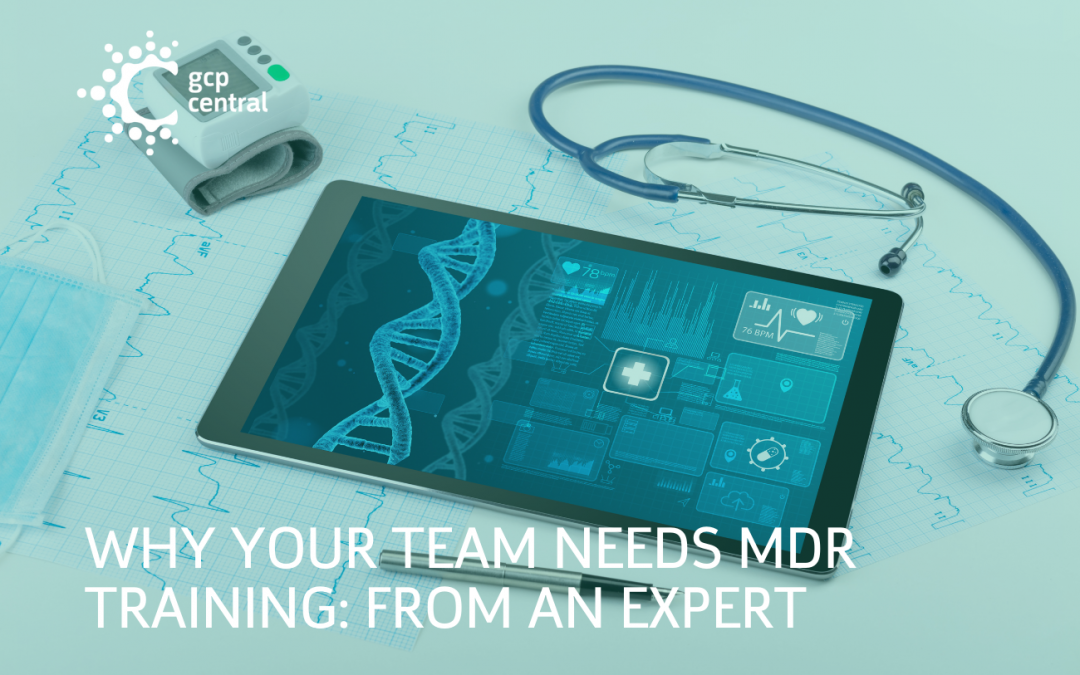The transition from the previous MDD to the new MDR brings a period of change. But what impact will this have on research and more importantly, what are the issues faced with non-compliance?
With over 20 years of industry experience in biotech, pharma, and medical devices, Esther Daemen is a renowned trainer and presenter on many areas of clinical research and compliance.
GCP Central met with Esther to discuss the difference between MDD and MDR, and the importance of being up to date with the changes to legislation.
Why training on trial conduct per the MDR?
The Medical Devices Regulation (EU 2017/745) has replaced the former Medical Devices Directive as the legislation defining manufacturer requirements for medical devices in the European Union.
The transition period for the MDR has been extended and depends on the medical device’s risk class, with all devices obliged to receive the MDR CE-Mark by December, 2028. However, for clinical trial conduct the MDR must be followed in full since the 26th of May, 2021. This is for all trials submitted for approval, all safety reporting, and trial conduct.
All manufacturers of class I to III products are now required to comply with the changes.
The Crucial Differences between MDD and MDR, and key changes to the regulation.
When comparing the MDD with the MDR, the new legislation is less centered on the pre-approval manufacturing stages of devices. Instead, the MDR focuses on a holistic view of the entire process, from trial to approval.
Other important changes are that clinical evaluations for implants and Class III devices must be collected through a clinical trial, with literature research no longer accepted for these medical devices. There is also a need for Post Marketing Clinical Follow-Up (PMCF) and Clinical Evaluation Reports (CER) for all devices; the need and level of detail depend on risk scale. More PMCF clinical trials may be required to collect the needed clinical data as evidence for safety and performance when not available through other means like literature research
It is crucial to be aware of the altered review timelines. These could be extended due to consulting of experts for Class IIa or IIB invasive devices and for all Class III devices. In practice, this could be applicable for a Class IIa SaMD/MDSW, so broadly applicable and affects many device manufacturers. Important to consider when planning market entry.
There are also more lenient submission, approval, and trial conduct regimes for PMCF trials, as opposed to trials for conformity assessment, as well as differences in label and implant card requirements
What is the impact on EU Member States?
EUDAMED will be the central database on medical devices and is one of the key aspects of the MDR. It will provide an overview of the lifecycle of devices in the EU, and integrates different systems to collate and process the information about medical devices and the companies that manage them.
With the legislation in place, but EUDAMED not ready as a central portal raises many questions. Will this have a big impact on trials that need to be compliant already, and what will happen when it comes online? For now, the SSCP is made available on request, or information given when it will be available.
There are also changes to how competent authority submission and approval requirements. Safety reporting has had definitions extended, and changes to requirments both pre, and post market and adjusted per trial risk. It is also important to note there are also adjustments to trial conduct that are different to the MDD.
Non-EU sponsors should be aware of changes to the requirments, and there are also changes to how modifications and corrective measures are handled by member states.
Be Ready For The MDR
The Medical Device Regulation is in place for trials starting now. Don’t risk non-compliance and lengthy delays to your clinical trials – it’s time to ensure that you and your team are up to date with the necessary regulartory training.
GCP Central offers an MDR Course for Clinical Research, designed for Investigators and Research staff involved in trials with medical devices in the European Union. Our highly interactive, self-paced course is written by experts like Esther, and with our e-learning course can be completed on the go, with all the flexibility of online learning.
Get your training here: For MDR training in the Netherlands, click here. For MDR training in Europe, click here.


